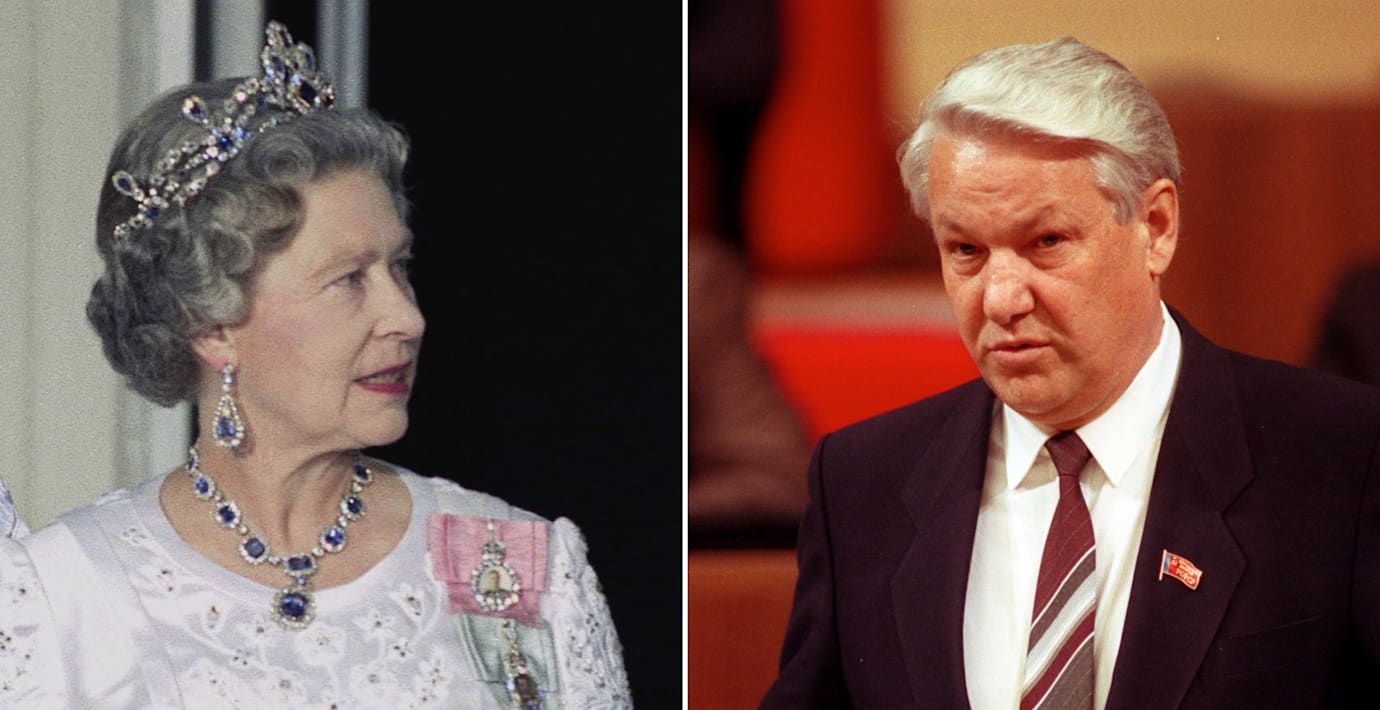
Jeltsin försökte lägga sin arm om drottning Elizabeth
När Boris Jeltsin 1992 var på statsbesök i Storbritannien som Rysslands president var hans närgångna sätt på gränsen till att leda till en diplomatisk incident, skriver The Telegraph.
Det framgår i brittiska myndighetsdokument som nyligen offentliggjorts att Jeltsin bland annat försökte lägga armen runt drottning Elizabeth II. Vid två tillfällen försökte Jeltsin ta tag i drottningens arm och en gång försökte han ta henne runt midjan. Drottningen ska dock artigt ha klivit undan i samtliga fall.
Jeltsin ska även ha lyckats få ”en halv kram” vid ett tillfälle när han skulle ta farväl av drottningens son – hertigen av York, ”som mycket väl hade kunnat följas av en omfamning om inte undvikande åtgärder hade vidtagits”.
bakgrund
Boris Jeltsin
Wikipedia (en)
Boris Nikolayevich Yeltsin (Russian: Бори́с Никола́евич Е́льцин, IPA: [bɐˈrʲis nʲɪkɐˈlaɪvʲɪtɕ ˈjelʲtsɨn] ( listen); 1 February 1931 – 23 April 2007) was a Soviet and Russian politician and the first President of the Russian Federation, serving from 1991 to 1999. Originally a supporter of Mikhail Gorbachev, Yeltsin emerged under the perestroika reforms as one of Gorbachev's most powerful political opponents. During the late 1980s, Yeltsin had been a member of the Politburo, and in late 1987 tendered a letter of resignation in protest. No one had resigned from the Politburo before. This act branded Yeltsin as a rebel and led to his rise in popularity as an anti-establishment figure.
On 29 May 1990 he was elected the chairman of the Russian Supreme Soviet. On 12 June 1991 he was elected by popular vote to the newly created post of President of the Russian Soviet Federative Socialist Republic (RSFSR), at that time one of the 15 constituent republics of the Soviet Union. Upon the resignation of Mikhail Gorbachev and the final dissolution of the Soviet Union on 25 December 1991, the RSFSR became the sovereign state of the Russian Federation, and Yeltsin remained in office as president. He was reelected in the 1996 election, in which critics widely claimed pervasive corruption; in the second round he defeated Gennady Zyuganov from the revived Communist Party by a margin of 13.7%. However, Yeltsin never recovered his early popularity after a series of economic and political crises in Russia in the 1990s.
He vowed to transform Russia's socialist economy into a capitalist market economy and implemented economic shock therapy, price liberalization, and nationwide privatization. Due to the sudden total economic shift, a majority of the national property and wealth fell into the hands of a small number of oligarchs. The well-off millionaire and billionaire oligarchs likened themselves to 19th century robber barons. Rather than creating new enterprises, Yeltsin's democratization led to international monopolies hijacking the former Soviet markets, arbitraging the huge difference between old domestic prices for Russian commodities and the prices prevailing on the world market.
Much of the Yeltsin era was marked by widespread corruption, and as a result of persistent low oil and commodity prices during the 1990s, Russia suffered inflation, economic collapse, and enormous political and social problems that affected Russia and the other former states of the USSR. Within a few years of his presidency, many of Yeltsin's initial supporters had started to criticize his leadership, and Vice President Alexander Rutskoy even denounced the reforms as "economic genocide".
Ongoing confrontations with the Supreme Soviet climaxed in the 1993 Russian constitutional crisis in which Yeltsin illegally ordered the dissolution of the Supreme Soviet parliament, which as a result attempted to remove him from office. In October 1993, troops loyal to Yeltsin stopped an armed uprising outside of the parliament building, leading to a number of deaths. Yeltsin then scrapped the existing Russian constitution, banned political opposition, and deepened his efforts to transform the economy. On 31 December 1999, under enormous internal pressure, Yeltsin announced his resignation, leaving the presidency in the hands of his chosen successor, then-Prime Minister Vladimir Putin. Yeltsin left office widely unpopular with the Russian population.
Yeltsin kept a low profile after his resignation, though he did occasionally publicly criticise his successor. Yeltsin died of congestive heart failure on 23 April 2007.
Omni är politiskt obundna och oberoende. Vi strävar efter att ge fler perspektiv på nyheterna. Har du frågor eller synpunkter kring vår rapportering? Kontakta redaktionen